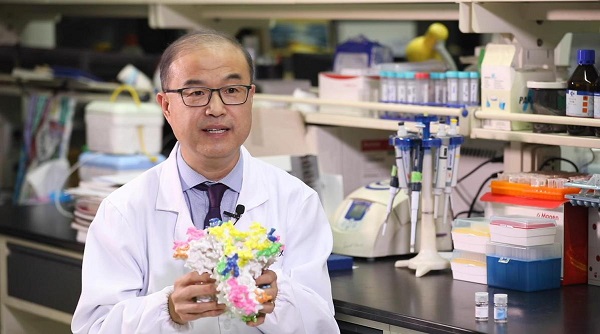New antibody drug to boost COVID fight

Zhang Linqi, leading scientist in developing China's first approved COVID-19 antibody drug, demonstrates a model of protein on the surface of the novel coronavirus. [Photo provided to chinadaily.com.cn]
Q: What is the difference between China's first approved COVID-19 antibody drug and similar drugs in other countries?
Zhang: During the research and development of our antibody therapy, we started by inhibiting multi-targets of the virus because we knew from the beginning that the virus had the potential to mutate.
When we selected the antibodies, we picked two from a total of 206 candidates. Each antibody is unique. Selecting outstanding antibodies from hundreds, even thousands of antibodies, is just like selecting the best talents from a crowd of people.
The selection standard was quite high. First, the antibodies needed to be able to identify the different locations where the virus unlocks human cells. Then, the two selected types of antibodies needed to be complementary in preventing the virus from replicating. Compared with similar antibody therapies developed in foreign countries, our drug is more active, better at resisting virus mutations and can maintain activity in human bodies longer.
Q: Can you explain how this antibody therapy works?
Zhang: When a virus infects a cell, it relies on an important type of protein: the spike proteins on its surface. The spike protein serves as a key to unlock a cell. If a virus cannot enter a cell, it will be eliminated immediately.
The job of our antibodies is to block the virus from entering cells. So its target is very precise. In addition, thanks to the coordination between the two antibodies, it is highly efficient and durable in inhibiting the virus and covers a broad spectrum of mutations.
Q: How will the new therapy help the fight against COVID-19?
Zhang: The antibody therapy is mainly used to treat patients with mild or moderate symptoms and those at a high risk of developing severe symptoms, including patients with severe underlying health problems such as diabetes and cardiovascular diseases. It can reduce the rate of hospitalization and death by 80 percent.
The antibody drug not only prevents the virus from penetrating cells, but also boosts our immunity because the antibody itself is part of our immune system.
The antibody drug is immediately effective once administered intravenously. It can stay alive in the human body for nine to 12 months. So it has great potential in preventing infection.
It is especially useful for high-risk groups, such as frontline medical workers and people not suitable for vaccination due to weak immune systems, liver and kidney problems and underlying health problems.
Q: Will we gain more market approvals beyond China to make greater contribution to the global battle against COVID-19?
Zhang: We're not only aiming at serving Chinese people but also people around the world. It is an international cooperation project.
After entering the phase one clinical trial in China, we conducted phase two and phase three clinical trials in areas with high COVID-19 prevalence as the epidemic had been basically brought under control in China.
We participated in a global trial program sponsored by the US National Institutes of Health. And we earned a high score among global competitors.
So we were able to conduct phase two and phase three clinical trials in 111 clinical trial sites in six countries.
Trial data found the therapy could reduce the rate of hospitalization and death of high-risk patients by about 80 percent.
On Dec 8, we were granted emergency approval by China's National Medical Products Administration.
At the same time, we have contacted the US Food and Drug Administration. We expect to gain US' FDA approval in the near future.
Many countries have already contacted us and expressed their wishes to use our therapy.
